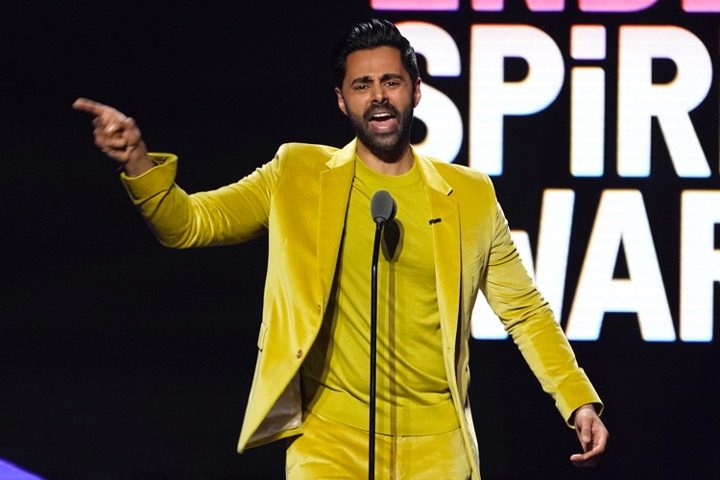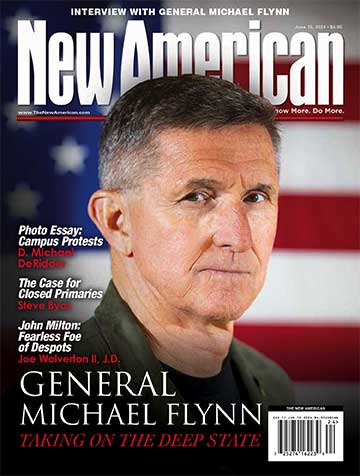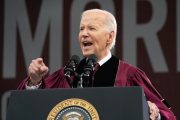
Known for his “social justice commentary,” he trades in lamentations about “white privilege” and “systemic racism”; he tells stories about bigoted white conservatives who did things such as send an envelope of white powder to his home and slam his teenage self on the hood of a car because he, a Muslim, joked post-9/11 about wanting to get his pilot’s license. The problem, it turns out, is that comedian Hasan Minhaj’s tales are tall ones — very tall. But now that he has been busted, by two left-wing journalists no less, Minhaj is not repentant but repugnant.
In fact, he defends his lies, calling them “emotional truths.”
(Now, perhaps, we know what kind of “truths” Joe Biden referenced when he proclaimed, “We choose truth over facts.”)
The original exposé on Minhaj, penned by thoroughly leftist mainstream media journalist Clare Malone and recently published by the ultra-liberal New Yorker, tells us a bit about the comedian. “Minhaj came of age as a practicing Muslim in an Indian family in post-9/11 America,” she writes. “His Netflix series, ‘Patriot Act’—a comedy news show in the mold of ‘The Daily Show’ and ‘Last Week Tonight’—was named for the defining law of that era.”
“The series won an Emmy and a Peabody Award during its two-year run,” Malone continues. “His stage work as a standup comic has led to two Netflix comedy specials, which have drawn plaudits for Minhaj’s blend of autobiographical storytelling and social-justice commentary.” What’s more, among the comedian’s honors is that Time magazine chose him in 2019 as one of its most influential people.
Time’s affection isn’t surprising. For in “Minhaj’s approach to comedy, he leans heavily on his own experience as an Asian American and Muslim American, telling harrowing stories of law-enforcement entrapment and personal threats,” Malone informs. “For many of his fans, he has become an avatar for the power of representation in entertainment.”
Put differently, he’s just what the mainstream media seek: an intelligent but “oppressed” minority who “bravely” reveals the Truth about “the man.” But then there’s that problem:
After “many weeks of trying, I had been unable to confirm some of the stories that he had told onstage,” Malone writes, dropping the hammer. “When we met on a recent afternoon, at a comedy club in the West Village, Minhaj acknowledged, for the first time, that many of the anecdotes he related in his Netflix specials were untrue.”
“Still, he said that he stood by his work,” Malone continues. “‘Every story in my style is built around a seed of truth,’ he said. ‘My comedy Arnold Palmer is seventy per cent emotional truth—this happened—and then thirty per cent hyperbole, exaggeration, fiction.’”
Of course, the “seed” here is likely nothing more than the leftist article of faith that America is irredeemably “racist,” white supremacist, and generally evil; all that’s now necessary is to proselytize effectively enough to convince people to accept this “truth” as dogma.
(In this Minhaj is much like documentarian Michael Moore, whose lies were also exposed by fellow liberals.)
In other words, Minhaj’s act is “really just the tired schtick of the anti-white narrative (white privilege, institutional and systemic racism against non-whites) retold ad nauseam by the pseudo-intellectuals providing cheap entertainment which can only appeal to a low-IQ (leftist) consumer,” writes commentator Olivia Murray, who dubs the comedian “Jussie Smollett 2.0.”
Except that Minhaj is far smarter than Smollett. Packaging his culture-rending lies as “entertainment,” nothing is legally actionable — it’s artistic license!
Speaking of which, Murray tells us that “Malone goes on to detail two of Minhaj’s fictional tales, like his young daughter’s exposure to an envelope of ‘white powder’ that prompted an emergency visit to the hospital and a threat of divorce from his wife with the implied culprit of course being a bigoted anti-progress (conservative) white person, as well as the persecution and violation of rights he and his family faced for their brown skin and religious beliefs.”
“Minhaj insisted that, though both stories were made up, they were based on ‘emotional truth,’ Malone writes. “The broader points he was trying to make justified concocting stories in which to deliver them. ‘The punch line is worth the fictionalized premise,’ he said.”
Joining Malone in not appreciating this fiction is fellow left-wing journalist Noor Noman. Yet as with Malone, her main gripe is most woke. “Lying about racism does a huge disservice to racial and ethnic minorities, and it will likely only buttress white supremacy, an apparatus designed to belittle and deny racism as it is,” she opined at MSNBC. “Having a high-profile brown person build his career in part around fabricated experiences with racism will only feed into this narrative.”
“Never mind the unsuspecting and innocent Americans slandered because they happened to be born with ‘white’ skin,” Murray retorts; “these made-up stories about white people being racist hurts the anti-white cause!” Never mind, too, that Minhaj is just the latest in an endless line of racial hoaxers.
Of course, it isn’t surprising that our demand for racism greatly exceeds the supply: A 2020 study found that the U.S. is one of the world’s least racist countries.
But this cuts no ice with the Minhaj types. They have their “emotional truth”; meaning, narcissist style, something feeling true to them is all that matters.
Imagine, though, the reaction if a white person fabricated damaging narratives about non-whites. How fast and how thoroughly would he be canceled?
Realize, however, that as with race hustlers Ibram X. Kendi and Robin DiAngelo, Minhaj has learned that peddling anti-white narratives pays. But do these people believe even half of what they say?
Perhaps, as with the sleazy tabloid journalist in the horror film Night Flier, their credo is, “Never believe what you publish, and never publish what you believe.”



